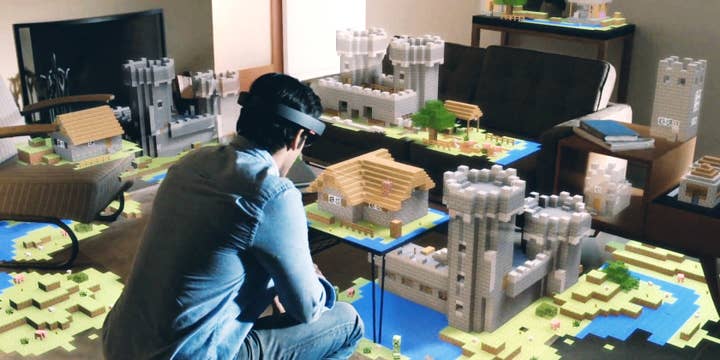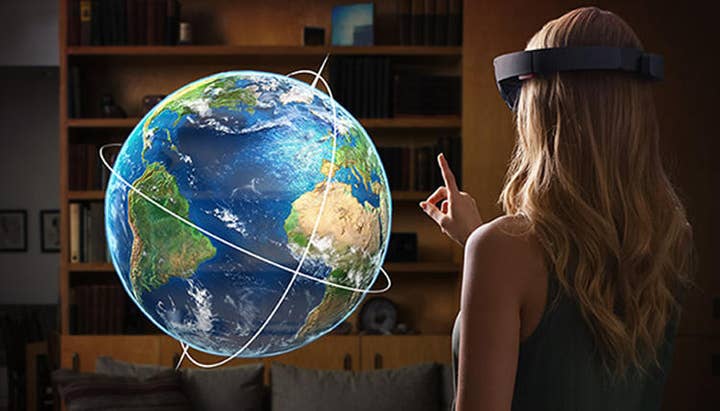Enterprise-first gives Hololens the best possible start
Taking the pressure off gaming "killer apps" and consumer appeal is the right choice for this technology
Of all the various headsets and goggles being sported at E3 this year, Microsoft's Hololens was perhaps the most unusual. Where Oculus, Valve and Sony are all ultimately aiming at the same goal - virtual reality - Microsoft has taken off on a tangent, focusing its efforts instead on a headset that augments the reality around you, placing virtual items into the world around you rather than replacing that world entirely. If Oculus Rift and Morpheus were inspired by Star Trek's Holodeck and The Matrix, the likely inspiration for Hololens is no less cinematic; Tony Stark's garage, with its VR workspace tools overlaid with and mingling among the real-world objects in the room.
At E3, the focus for Hololens was on Minecraft, which is pretty much the only game that we've seen the device doing thus far. The Minecraft demo was pretty impressive, by all accounts, and the finished thing will probably be pretty cool - although putting a castle on your tabletop is obviously going to lose much of the actual appeal of Minecraft, in terms of the enormous world it invites you to explore and conquer. It's still a tech demo, not a game, per se - much as you'd expect for a product so far from launch.
Ever since the reveal of Hololens, I've been simultaneously fascinated by the technology and completely unable to see how the hell it fits into the world of videogames. VR is a clear progression of existing display and control concepts; it's going to take a lot of work to make existing games actually playable and enjoyable in VR, and new genres will probably pop out of the possibilities it creates, but VR fundamentally begins from a position of being understood. You go into a game world that used to be on a TV screen in front of you. Okay, got it; the foundations are there.
"What Microsoft is recognising, to a large extent, is that what it's really good at is enterprise platforms - but that enterprise platforms are exactly where videogames were born and grew up"
Augmented reality, though; how does that work with a game world? I mean, you can imagine some cool stuff like Street Fighter characters battling on a tabletop, or tanks roving around living room furniture taking pot shots at one another, but these are more like toys or distractions than fully-fledged games - and even Minecraft, a game which when confined to a 2D viewport can provide months upon months of entertainment, felt like it would fall into that category on Hololens. How do you make something in-depth and involved work on this tech? Virtual pets, perhaps? Warhammer without the figure-painting? I can see ways and means of doing cool things on Hololens; I just can't see the firm foundation ("it's a shooting game, but you're actually inside it!") that VR has.
That's worrying, because you need to have a firm foundation in order to convince people to shell out a lot of money for an expensive new consumer product. Will people buy an expensive headset to participate in experiences that are essentially toys or distractions? Some will, but most won't; you won't get an installed base significant enough to attract further developers, and the whole thing will end up with a reputation for being a gimmick and end up dying, far less loved than its technology deserved. Of the goggles and headsets, then, I thought Hololens perhaps the most interesting, and certainly the most likely to be dead in the water within a year of launch - joining the likes of Kinect 2 in the cemetery of genuinely good Microsoft tech that's simply not made it.
That's why this week's statement from Microsoft CEO Satya Nadella that Hololens is not being pushed as a gaming device, but rather as an enterprise product, is such a big deal. In saying that games aren't the initial target market for Hololens, Nadella has actually made me think this product could have a huge, huge future in games.

Here's why; if Hololens is sold as a gaming accessory, it will follow the trajectory noted above - early adopters will pick it up, the early games will be cool but unsatisfying, the mantra will become "it's got no real games" and the system will die. Hobbyists and academic researchers will find cool non-gaming applications for the tech which will be featured on the likes of BoingBoing regularly, but it will never find widespread enterprise adoption because it's tainted by being seen as a gaming product, and a failed one at that. If this all sounds familiar, it's because it's precisely what Kinect did.
Microsoft has apparently learned its lessons from Kinect. Hololens is going to do things in reverse; building up a commercial market in the enterprise space, finding applications in training, in visualisation, in medicine, in productivity and hell, in Tony Stark's garage, if he fancies an upgrade. It'll build a solid installed base and improve its technology in that field, and then, as prices drop to consumer level, the games will come naturally. It'll probably start with people using the headsets in their offices playing Streetfighter on their desks or Tanks in the break-room; the toys and distractions are exactly what you want when the headset is for work but is cool enough to want to do gaming stuff with in your downtime. As developers build experience from that and consumers start to buy the headsets, more complex game ideas and whole new genres will emerge to take advantage of the unique possibilities of the platform.
Perhaps that trajectory sounds familiar too; it should, because it's essentially the story of how PC gaming came about. What Microsoft is recognising, to a large extent, is that what it's really good at is enterprise platforms - but that enterprise platforms are exactly where videogames were born and grew up. If it views Hololens and its successors as a truly big part of the future, it knows that it will naturally evolve into a gaming platform - the technology is too cool for people not to want to play games on it - but that before becoming viable as such, it needs to prove its worth in the workplace, the laboratory and, well, Tony Stark's garage.
"I'm certain that VR headsets will find their niche (though it may be much smaller than proponents are hoping), but Hololens remains on longer odds. This little extra glimpse into Microsoft's strategy, though, is extremely encouraging"
There's much that could go wrong with this plan. The primary pitfall is that enterprise might not be keen on the technology - though I think that some fields, like architecture, engineering, and medicine will leap at it. My own work involves a lot of data science, and I'd tear someone's right arm off for a Hololens that works as well as the ones in Microsoft's promotional videos and allowed me to explore and visualise my data in an AR workspace. Still, my own case and some imagined ones do not sum up to detailed market research, but one would imagine that Microsoft's research into the scale of the market it can address with Hololens in enterprise is pretty good.
Beyond that, Hololens faces other problems; it has implemented its technology in such a way as to dodge the creep-factor that effectively ended Google Glass, but it may find itself treading boundaries of social acceptability in homes and workplaces in other ways. The cost of the technology may also be an issue, and as with Kinect, there's always the question of how much space you actually need to use the technology (demos up until now have taken place in large, reasonably sparse rooms). Nonetheless, by coming from the enterprise angle rather than pitching directly to game consumers, many of those problems are given time and space in which to be solved rather than being day-one dealbreakers.
I still don't feel like Hololens is a sure bet; I'm certain that VR headsets will find their niche (though it may be much smaller than proponents are hoping), but Hololens remains on longer odds. This little extra glimpse into Microsoft's strategy, though, is extremely encouraging. Upgrade me from "sadly pessimistic" to "cautiously optimistic" in the sweepstakes; I think perhaps Hololens-style augmented reality may be a part of the future we're waiting for after all.

